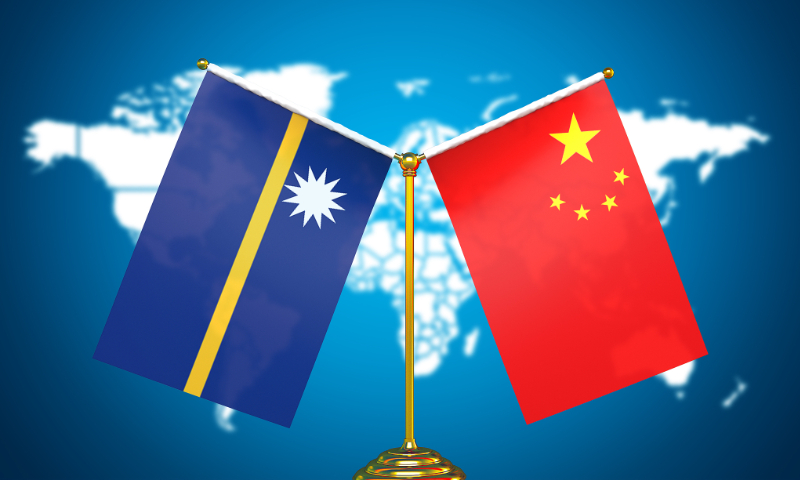
China Nauru Photo: VCG
Nauruan President David Adeang arrived in Beijing at noon on Sunday, embarking on a six-day state visit to China from Sunday to March 29. It marks the first visit by a Nauruan president after the two countries resumed diplomatic ties in January 2024.
Experts believe the trip will enhance political mutual trust and understanding, which will serve as a springboard from which further and more substantial cooperation can be realized. The deepening China-Nauru ties will also have a strong demonstration effect on the three Pacific Island Countries (PICs) that still maintain the so-called ties with China's Taiwan region, prompting them to stand up to US interference and make the right decision.
Upon Adeang's arrival, the Chinese Embassy in Nauru published the first article on its official WeChat account on Sunday morning, noting that the two countries, standing at a new historical starting point, will continue to jointly commit to deepening political mutual trust, promoting mutually beneficial cooperation, enhancing people-to-people friendship, and advancing bilateral relations to new heights.
As developing countries and members of the Global South, the article read, China is willing to work with Nauru to jointly advance high-quality Belt and Road cooperation, strengthen coordination in international affairs and uphold the common interests of developing countries.
The Nauruan president's trip reflects his country's strong desire to further cement and advance ties with China. "It is both politically significant and economically practical," Chen Hong, director of the Australian Studies Center of East China Normal University, told the Global Times on Sunday.
From a political perspective, Chen noted, it is necessary for both sides to reestablish mutual trust. Adeang's visit will promote mutual understanding and align each other's demands and needs, as well as stances on hot-button issues.
As for pragmatic cooperation, Nauru possesses phosphate deposits that can be used in various applications, including raw materials for fertilizers, which China has a substantial need for. The rich agricultural, fishery and tourism resources of Nauru will also provide important conditions for cooperation between the two sides, Chen noted.
In turn, by partnering with China, Nauru can purchase manufactured goods with higher cost-effectiveness. Moreover, China's assistance and cooperative projects under the China-proposed Belt and Road Initiative have proven to bring substantial benefits to the PICs.
Yu Lei, chief research fellow at the Research Center for Pacific Island Countries of Liaocheng University, told the Global Times on Sunday he believes that during the visit, the two sides are likely to sign cooperation agreements in areas including economy and trade, fisheries, education and health, climate change and environmental protection, as well as infrastructure.
Nauru announced it would sever "diplomatic relations" with China's Taiwan region in January on the heels of the island's regional election. On January 24, China and Nauru officially resumed diplomatic ties, unveiling a new chapter for bilateral relations.
The decision leaves only three countries in the Pacific Island region that still maintain the so-called relations with Taiwan - Tuvalu, Palau and the Marshall Islands.
In fact, it is evident to all that following Nauru's historic decision, some Taiwan secessionists vented their frustrations while showing complete disrespect for the Nauruan government and its people, which exposes that Taiwan's ruling Democratic Progressive Party's true intention in maintaining ties with the PICs is to serve its own political interests, Chen said.
Observers further pointed out that the three island nations have already shown great eagerness to develop relations with China. However, under the political and economic pressure from the US, they were forced to become the pawns of the American strategy to hinder the peaceful reunification of Taiwan and the great rejuvenation of the Chinese nation.
Despite pressure from the US, however, the overall trend of severing ties with Taiwan is unstoppable, experts noted, expressing confidence that the Nauruan president's China visit will set an example for the remaining few to make the right choice, withstanding interference from both foreign and domestic forces.
An example at hand is the case of Nauru, which decided to reinstate relations with China after observing the practical results of China's cooperation with the Solomon Islands, Yu noted.
"They have come to realize that the greatest characteristic of cooperation with China is equality and pragmatism, and this is a key reason why the PICs are particularly willing to get closer to China," Yu said. "Thus, the deepening of China-Nauru ties will also have a strong demonstration effect on the remaining three island nations."




